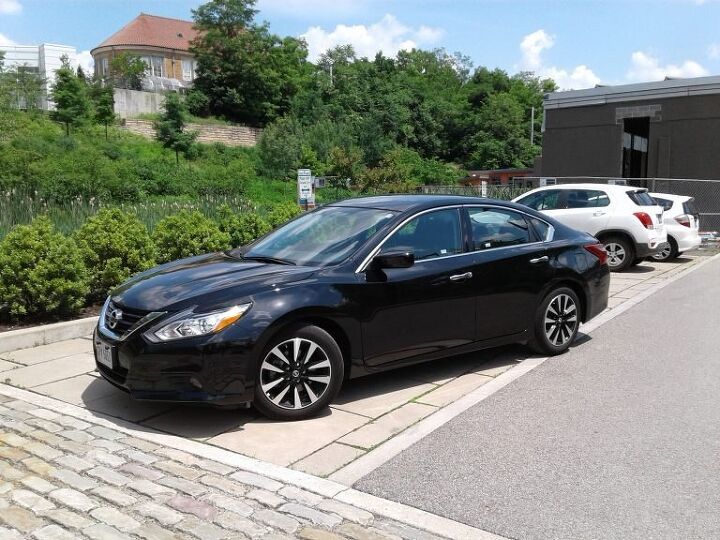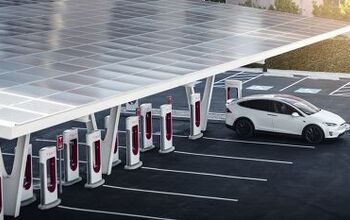Speaking of Fleet Sales… There's Another Nissan Altima Hood Recall

The previous-generation Nissan Altima gained an unfavorable reputation as a rental lot darling (ask Corey about his Midwest comfort cruise), but another issue plagued the model: Hoods not staying shut when they’re supposed to.
Nissan issued recalls in 2014, 2015, and 2016 in an attempt to remedy a hood latch corrosion issue that caused some hoods to fly open unexpectedly while underway. Now, the automaker has decided to expand that recall to the entire generation, calling back 1.8 million vehicles for a fix it hasn’t yet devised.
Some 1,831,818 Altimas are included in the recall, covering model years 2013 to 2018. A new Altima bowed for 2019 that doesn’t seem to have the issue.
In documents provided to the National Highway Traffic Safety Administration, Nissan describes the issue as being “due to a combination of the model front end design, anti corrosion limitations and location of the hood latch release in close proximity to the fuel door release.”
“Over time, build-up caused by driving with the primary hood latch disengaged allows excessive, corrosive contaminants to contact the hood latch assembly. This build-up, combined with a lack of proper inspection and maintenance of the secondary hood latch, can create mechanical binding that could cause the secondary hood latch to remain in the open position after it has been disengaged.”
The potential consequences of such a problem — in the event that the primary latch is inadvertently released — are obvious. For the record, a hood that flew open due to latch corrosion once earned this writer a serious amount of embarrassment from a carload of female friends, though that particular incident was Chrysler’s fault.
Besides Nissan’s admission that 100 percent of the recalled vehicles contains the potential fault, another problem arises in the fact that the automaker isn’t quite sure what a permanent fix looks like.
“The interim notification will instruct owners how to properly maintain the latch per the Owner’s Manual general maintenance requirements and include a reminder to fully close and engage the primary hood latch each time before driving,” Nissan stated.
The recall is expected to commence on June 22nd.
[Image: Corey Lewis/TTAC]

More by Steph Willems
Latest Car Reviews
Read moreLatest Product Reviews
Read moreRecent Comments
- Sayahh I do not know how my car will respond to the trolley problem, but I will be held liable whatever it chooses to do or not do. When technology has reached Star Trek's Data's level of intelligence, I will trust it, so long as it has a moral/ethic/empathy chip/subroutine; I would not trust his brother Lore driving/controlling my car. Until then, I will drive it myself until I no longer can, at which time I will call a friend, a cab or a ride-share service.
- Daniel J Cx-5 lol. It's why we have one. I love hybrids but the engine in the RAV4 is just loud and obnoxious when it fires up.
- Oberkanone CX-5 diesel.
- Oberkanone Autonomous cars are afraid of us.
- Theflyersfan I always thought this gen XC90 could be compared to Mercedes' first-gen M-class. Everyone in every suburban family in every moderate-upper-class neighborhood got one and they were both a dumpster fire of quality. It's looking like Volvo finally worked out the quality issues, but that was a bad launch. And now I shall sound like every car site commenter over the last 25 years and say that Volvo all but killed their excellent line of wagons and replaced them with unreliable, overweight wagons on stilts just so some "I'll be famous on TikTok someday" mom won't be seen in a wagon or minivan dropping the rug rats off at school.


































Comments
Join the conversation
While I am 100% safe from ever having an Altima issue, as someone who keeps cars too long, and lives in a salt zone: I am always amazed at the quality of metal used and the choices made. I had an older BMW that at 150k still had easy to break bolts...and other cars where most of the bolt were frozen and rusted by 80k. The cheaping out though is made clear by the fact that a few bolts, mostly suspension, were spec-d as a higher quality steel, and shiny while the other fasteners were returning to the natural oxide state. This is a choice...years of playing with jetskis and boats have shown that you can use salt resistant metals...ok, they cost more, and in the car business half pennies count...but my 15 year old BMW that died of body rust still had bolts you could work with, meanwhile, my 3 year old Acura product had bolts holding on some heat shields that rusted out promptly causing a nasty vibration and noise....just out of warranty. That half cent of material savings backfired here. The planned obsolence target was missed.
BMWs, Volvos and VWs are built with steel capable of lasting a long time even in the salt belt. But the opposite is true of their window regulators, water pumps and other plastic parts which are more disposable in nature. By contrast, post-2000 Nissan is remarkably consistent in applying wafer-thin quality to every area of vehicle construction. It seems that everything from hood latches to floor panels to CV transmissions fails with just enough regularity to assure shareholders that no part is overbuilt.